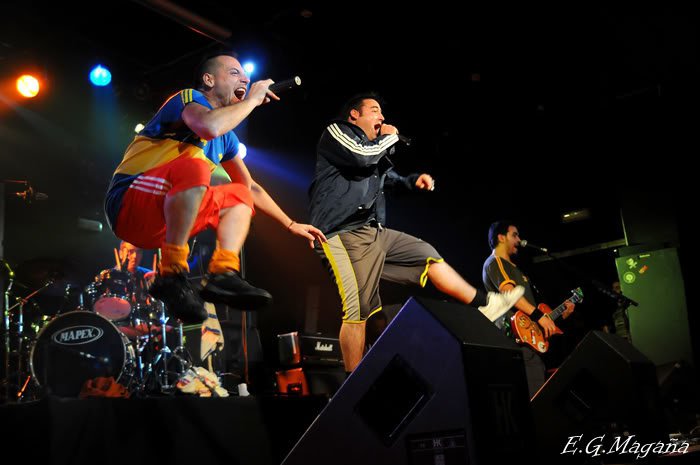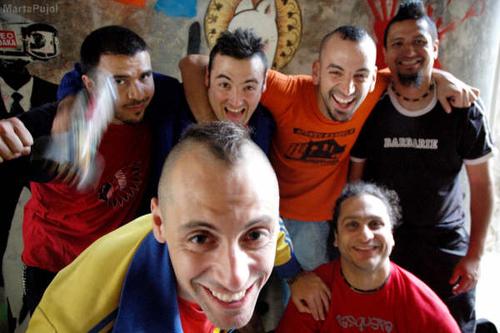In today’s world of pop homogeneity it’s rare to get a band name that actually means something. With one like Che Sudaka, you know the Barcelona-based, punk-ska- cumbia outfit, is making a statement. And of course you want to know more.
The word ‘Che’ – apart from being the revolutionary icon behind one of the most used images in history and what city traders, with no sense of irony, now like to call their children - is an Argentine word, of Mapuche origin, that Argentines use to call each other, much like ‘dude’ for the Americans, or ‘mate’ for Aussies (now calling a child ‘dude’ would be cruel). It has also become a way of identifying an Argy, hence the Cubans famously, and of course jokingly, naming their revolutionary hero Ernesto Guevara ‘El Che’ (The Che).
So clue number one solved: there are Argies in this group. On to Sudaka (usually spelt Sudaca) - the pejorative word that some Spaniards use to describe Latin Americans, like Paki in English. So the band members are Latin American immigrants in Spain, I think. I am getting more curious, and find lead singer Leo, unashamed to explain that all the band members were living illegally in Spain when they met.
“We got to know each other like all immigrants in Barcelona, living in the neighbourhood where all the immigrants live, El Barrio Gotico, on the street, in our case, playing music. ” The thing that was legal, back then atleast, was playing music in the street. But, he laments, “you can no longer do that, since the ‘ley.’ If we arrived in Barcelona today, we may not have met each other.”
By ‘ley’ Leo means the law brought in by the new mayor of Barcelona in 2006 that prevented musicians from playing in the street without permission. Even though Che Sudaka no longer have to, the band still play in the street when and where possible. According to Leo, they just play. All the Time. Amplified, unplugged, in bars, in streets, clubs, in stadiums, or to festivals with 50,000 people.
“I think if you don’t have a big marketing machine behind you, the best promotion is just to do good concerts,” he says, adding quite unapologetically, “we are not really inside the mainstream music industry, we just do our own thing and don’t depend on anyone else. We put out our own music and hope people like it.”
The strategy, if you can call it that, seems to be working. Their 2009 album TUDO É POSSIBLE, made it to #15 in the European World Music Charts off the cuff and was deemed fifth best world music album by Spanish music magazine Mondo Sonoro, and best World Msuic album by Spain’s Independent Record Union. They are on tour, pretty much constantly.
Che Sudaka couldn’t be further away from a manufactured pop band, with slick production and marketing values and celebrity obsession. What it lacks in good looks, however, it makes up for in high-energy optimism, combined with the grungy friendliness, the sentiment of solidarity, grassroots activism, connection with the public.
On seeing them perform, one immediately thinks of Manu Chau, fatter versions of. Their music, which they call, "mestizaje music" combines traditional South American styles such as cumbia, vallenato and salsa with ska, reggae, rock and world music. It’s no surprise to learn that they’ve collaborated with the mysterious Latin American-influenced, French-Galician who also made Barcelona his home.
“We met Manu in the neighbourhood when we first arrived and began playing football together. He’s been a great support and is an amazing person and inspiration”
In a sense, however, the Manu influence is in reverse. After all, Che Sudaka embody the musical cultures that influenced Manu Chau (especially the Colombian). And though there is definitely an air of Mano Negra, the high-octane ska, punk band that first propelled Manu Chau onto the music scene, about them, Latin America has its own strong tradition of ska, reggae, even metal.
“We all had bands back in Latin America. I had a ska band, my brother played in a Murga, and we would do a loot of benefit and free concerts. Sebastian, the other Argentine had a reggae band in Cordoba and the Colombians, from Bogotá, had a new metal band. Playing in Barcelona, we started putting in more of our Latin American influences, such as rumba and cumbia.”
Within Latin America, however, Argentina and Colombia are worlds apart, ethnically, musically and many other ways. Colombia is known for its great Afro-Latin rhythms – producing some of the continents greatest salsa and cumbia - although, for whatever reason, you do find a lot of metal fans (known as the metaleros). For its part Argentina has produced Latin American’s biggest rock icons – Charly Garcia, Spinetta, Soda Stereo. What did you learn from each other, I ask?
“What we’ve most learnt is that in South America we all live with the same realities, even though we are made to feel by our governments that we don’t, telling us that our country or culture works better than our neighbours. But in all our countries there is the same inequality of wealth, abuse of power, corruption and we all experience it.”
Even if jumping up and down in a sweaty crowd, watching a bunch of sweaty men, also jumping up and down, on stage isn’t your cup of tea, there is something alluring about this Argentine and Colombian melange. Their incredible range of musical influences is perhaps what really unites them – from Portishead, The Clash, and Rage Against the Machine to Bob Marley and Harry Belafonte, via Ruben Blades, Grupo Niche, and Diomedes Diaz, the great Colombian vallenato singer and composer.
It is a range of tastes that could only converge in Latin America, where exposure to US and European music via radio and music channels is often greater than their own, and it takes discipline to find your own musical roots amidst the clutter of cultural imperialism. In the end Latin Americans are the richer for it. I mean, how many Europeans do you find appreciating both heavy metal and salsa? The end result is a unique and, more importantly, authentic melange, and one which clearly has its appeal.
I wonder if being in Spain brings Latin Americans together more. Is there an immediate solidarity among the Latin American immigrants?
“Its not really a conscious decision of solidarity, but just realising that we are no different. Even with the Spanish, it is not like I see it as us against them. We look for the things we have in common rather than the differences.
Perhaps for a journalist, it is tempting to see this band more as an expression a demographic phenomenon, than just listen to the music. When Leo says that “We actually play more outside of Spain than inside,” I think, oh that’s significant. Does it mean the Spanish market is not yet ready to embrace a band of immigrant Sudacas?
Even though Leo is careful not totalk badly about host country, as a band they do not shy away from the issues of immigration and the appalling treatment immigrants in Europe often receive. The immigrantion issue is central to the band's identity, says Jota, one of the two Colombian members of the group.

"It's very important for us because we experienced first hand the discrimination related to our condition of being immigrants," says Jota."For example when we were denied the right to free movement (art. 3 Human Rights Declaration) as many other immigrants, just because of our nationalities (especially for the Colombian ones in the band) or, for example, when I was personally told I should work harder than others because I was an immigrant."
More than anything for the members of Che Sudaka, are up beat: for them it is about the music, and the joy of the experience. “We are doing tours all the time. The aim is just…to play. For us it doesn’t matter what nationality the audience is, if they love us we love them back.”
Che Sudaka will be playing as part of La Linea Festival, supported by the Instituto Cervantes, on Friday 27th April at the Village Underground















